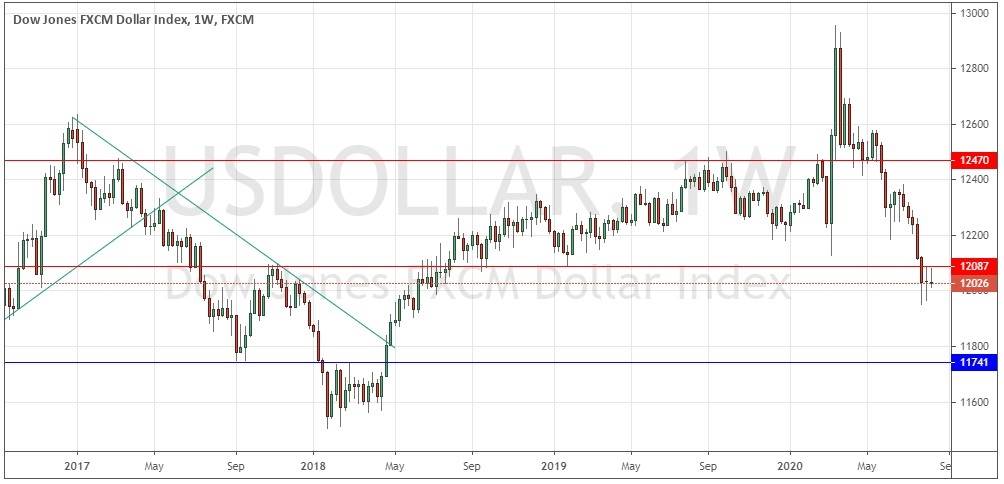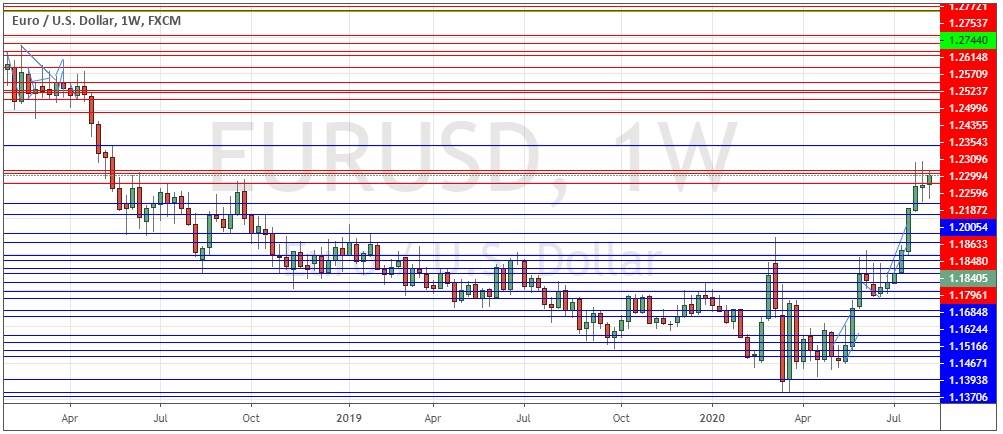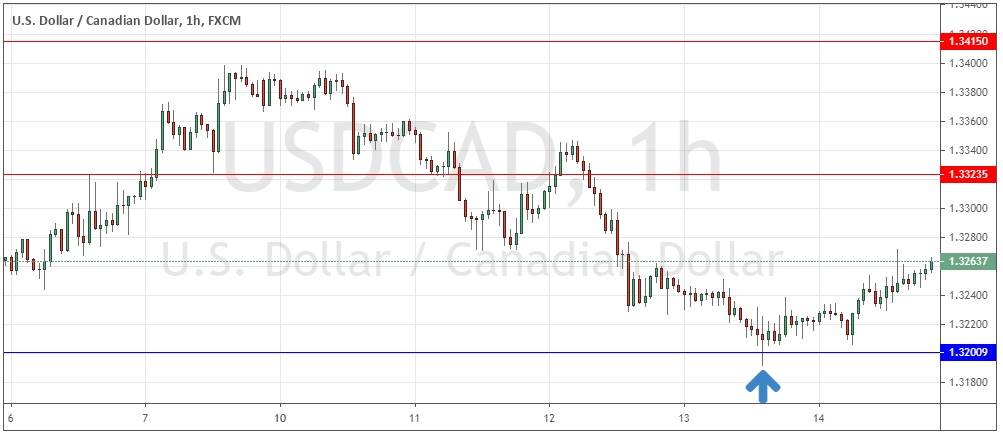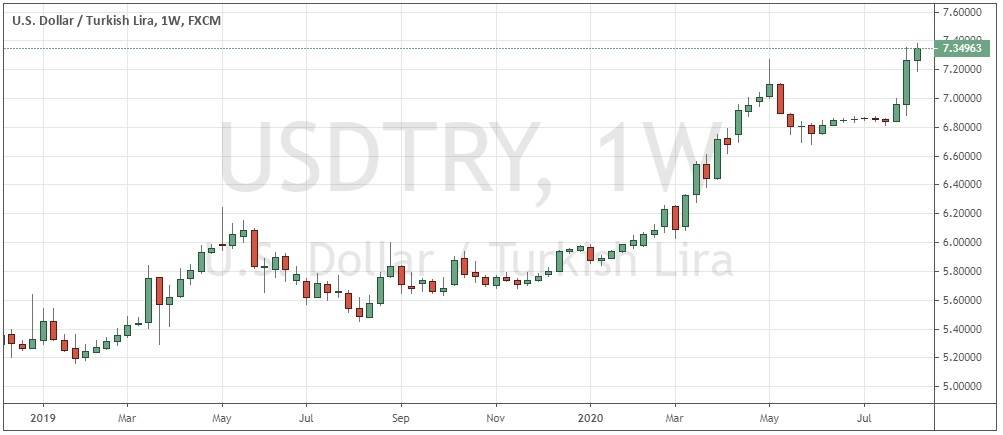The difference between success and failure in Forex trading is very likely to depend mostly upon which currency pairs you choose to trade each week, and not on the exact trading methods you might use to determine trade entries and exits. The current market environment has changed from one of crisis to a questionable rebound or recovery, despite the continuing growth in the coronavirus pandemic which is still sweeping the world.
Big Picture 16th August 2020
In my previous piece last week, I saw the most attractive trade set-ups as likely to be long of Gold and Silver, and long of EUR/USD. However, I said that entries should wait until new daily high closing prices were made, and none of these assets made such a new high, so no trade entries were triggered. This is just as well, as although the EUR/USD currency pair ended the week higher, Gold and Silver did not in U.S. Dollar terms.
Last week’s Forex market saw the strongest rise in the relative value of the Canadian Dollar and the strongest fall in the relative value of the Japanese Yen.
Fundamental Analysis & Market Sentiment
The world is not coming to an end, but we are living in an extraordinary time of global health crisis, the magnitude of which has not been seen in over one hundred years. The vast majority of people are going to survive and be healthy, yet the impact of the crisis still dominates the global economy, as the virus is appearing to be resurgent even in countries that had initial success in suppressing its spread.
The economic impact of the virus seems to be transferring income streams from smaller to larger businesses and boosting the profitability of large tech companies.
The market’s focus now is centered on the political dispute in the U.S.A. over the terms of additional fiscal stimulus which the U.S. economy is seen to require as the U.S. economic recovery is endangered by the resurgent coronavirus.
Possibly the second major issue now is progress being made in a number of channels towards a safe and effective coronavirus vaccine. If such a vaccine is credibly confirmed, this can be expected to boost global economic optimism.
Last week saw the number of daily new confirmed coronavirus cases hold up just below its all-time high. This is a sign that globally, the wave of the disease may well still be advancing to a peak, although there are initial signs a plateau may have been reached.
We have seen the epicenter of the global coronavirus pandemic move into Latin America, although the U.S.A. has overtaken Brazil to again become the country with the highest average number of daily deaths from the virus. The rolling averages of deaths have decreased significantly in Europe.
Latin America and the Caribbean are now responsible for approximately 45% of confirmed new daily deaths, with the U.S.A. at 18% and Europe at about 5%. The strongest growth in new confirmed cases is happening in Albania, Argentina, Bahamas, Bahrain, Bangladesh, Belgium, Belize, Bolivia, Brazil, Bulgaria, Colombia, Costa Rica, Croatia, Czech Republic, Denmark, Ecuador, Ethiopia, France, Georgia, Greece, Guatemala, Hungary, India, Indonesia, Iran, Iraq, Israel, Jordan, Kosovo, Kuwait, Lebanon, Malta, Mexico, Moldova, Morocco, Nepal, Netherlands, North Macedonia, Paraguay, Peru, Philippines, Poland, Portugal, Romania, Senegal, Slovakia, Spain, Sweden, Trinidad, Tunisia, Ukraine, United Kingdom, Uruguay, and Venezuela.
The U.S. stock market rose again a little last week to make its highest weekly close since February, and its second-highest weekly close of all time. The S&P 500 Index is now very close to the all-time high made early in 2020. Despite these high prices, analysts tend to be concerned about the persistence of unemployment from earlier closures and restrictions and the economic impact of the reversals of easing which have been imposed in several states. However, the market still hopes to see an additional and far-reaching stimulus package from the federal government soon, despite the current political impasse.
The European economic recovery still seems to be in relatively good shape although there are signs that the coronavirus is growing again in some countries, especially France and the Netherlands. Nevertheless, this macro environment has continued to help boost the Euro.
The U.S. Dollar was again practically unchanged overall last week, while precious metals finally sold off from their recent long-term high prices. There is an increasing feeling that the Eurozone economy may be better placed to recover from the economic impact of the coronavirus than the U.S. economy, which has helped boost the Euro against the U.S. Dollar. The Canadian Dollar has also been strong, boosted by the recovery of the price of Crude Oil as a major oil producer.
The coming week will bring almost no important releases concerning major currencies: as we are now well into August, which is traditionally a holiday season in much of the world, we can probably expect a relatively quiet market this week.
Technical Analysis
U.S. Dollar Index
The weekly price chart below shows last week printed an inside bearish pin candlestick at a new 2-year low closing price. The high of the week’s range rejected the resistance level I identified at 12087 which is an additional bearish sign. There is a long-term bearish trend, as the price is lower than it was both 3 and 6 months ago. Overall, next week’s price movement in the U.S. Dollar looks more likely to be downwards than upwards.
EUR/USD
Last week printed a bullish inside candlestick, which closed at a new 2-year high weekly closing price. This is a bullish sign and we have a long-term bullish trend to support that. Trends in this currency pair have been relatively statistically reliable over many years. I am prepared to take a long trade here, but I still want to see a daily (New York) close above 1.1876 before going long.
USD/CAD
The Canadian Dollar is in a long-term bullish trend and rose again last week against the U.S. Dollar, producing the bearish trend we see here in this currency pair. The “Loonie” is currently one of the strongest major currencies, but bears should probably be wary of the key support level at 1.3200 which held after being hit.
USD/TRY
The Turkish Lira continues its long-term decline, showing strongly bullish movement over the past few weeks to new all-time lows against other major currencies such as the U.S. Dollar. Trading this pair long can be challenging due to high spreads and a very high overnight financing fee, but it is definitely a trade based upon strong fundamental factors.
Bottom Line
I see the most attractive trade set-up for this week as likely to be long of EUR/USD, but only after a New York close above 1.1876.





